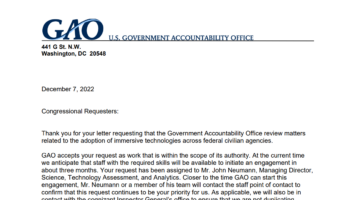Washington, D.C. – Lawmakers on Capitol Hill recognize the critical importance of standards development for emerging technologies. In an effort to increase U.S. participation, Senators Mark Warner (D-VA) and Marsha Blackburn (R-TN) introduced the Promoting United States Leadership in Standards Act of 2024 earlier this year. With respect to immersive technology (virtual reality, augmented reality, mixed reality, and spatial computing), there has been a proliferation of standards development organizations working groups (SDOs) focused specifically on XR standards in recent years. Unfortunately, U.S. participation in these SDOs does not match the level of participation undertaken by competitors like China, and allies like the EU.
In November of 2023, the XR Association, a leading trade association representing the growing ecosystem of immersive technology companies, published a white paper examining how governments across the world including China, South Korea, the EU, the UK and the U.S. are creating the enabling environment necessary for XR to flourish by investing in research and innovation, establishing regulatory certainty, and building trust for data-driven technologies like XR. In contrast to these other nations, the U.S. has not put forward a vision for XR, despite its importance to the economy and national security, and risks falling behind.
Drawing from the findings of the Reality Check white paper, the XR Association published a pamphlet highlighting the need for stronger U.S. engagement in international standards development for the metaverse and XR technologies. This engagement is not just about keeping pace with technological advancements but ensuring that these developments reflect and uphold the values and interests of the U.S.
XRA’s pamphlet outlines the key standards initiatives currently underway. Our aim is to help lawmakers see that the U.S. is in danger of falling behind in this area at a critical moment – and to encourage the federal government to empower and incentivize U.S. stakeholders to play a bigger role.





